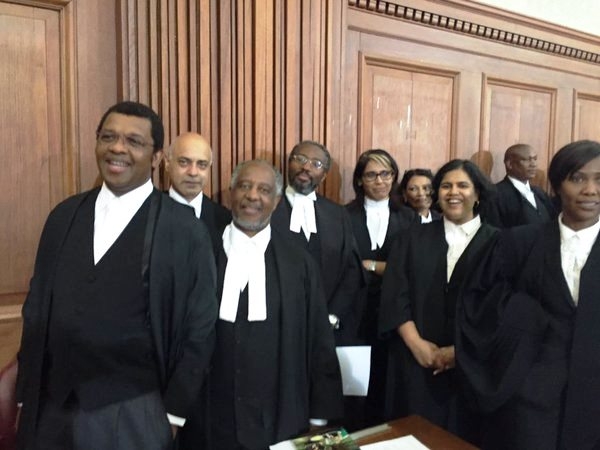Black advocates tell court they object to ‘racist sting’

This morning, in the silicosis class action, black advocates requested the opportunity to address the court regarding remarks made by a member of one of the legal teams. Approximately 150 black advocates, mostly women, were at court in solidarity with the statement. According to John Stephens, a lawyer with SECTION27, leaders of each legal team “undertook to address the entrenched patterns of racial exclusion in the profession.”
Declaration
For submission to the Court in the Silicosis matter on behalf of ADVOCATES FOR TRANSFORMATION (AFT) members and other concerned Advocates of the JOHANNESBURG BAR COUNCIL.
We, the undersigned, ARE ALL PRACTISING ADVOCATES AND MEMBERS OF THE JOHANNESBURG BAR, and we declare that:
[1.] A racist statement directed at black advocates has been placed in the public domain by one of the legal representatives appearing for the applicants in the present matter. The racist sting of the statement was that the vast majority of black advocates are:
1.1. incompetent;
1.2. unintelligent;
1.3. non-exceptional;
1.4. greedy and not prepared to be paid reduced fees;
1.5. not suitable for or interested in public interest cases; and therefore
1.6. briefing them could only be a matter of “charity” and “experimentation”.
[2.] We reject these blanket and unwarranted attacks on us and other black colleagues as untrue and motivated by the kind of racial bigotry and prejudice which is inimical to and in gross violation of the spirit and letter of our democratic Constitution.
[3.] The reasons why we feel it is necessary, respectfully, to beg the leave of the court to have the statement noted on the record are:
3.1. The issue is already in the public domain and it is associated with this case;
3.2. Although at face value it might seem to be an external matter, in fact this statement implicates the integrity of the proceedings taking place in this and other courts in South Africa, as well as the parties in this matter and that of counsel appearing herein;
3.3. We are the direct victims of the racist remarks made which not only constitute a gross violation of our human rights but also the perpetuation of apartheid, a crime against humanity as declared by the United Nations;
3.4. We are officers of this court and merely wish to be granted an indulgence.
[4.] Using the platform of a court, directly or indirectly, to make racist remarks is abhorrent conduct bordering on contempt of court and a person doing so should not escape the censure of the court purely on the technicality that the statements were made outside the courtroom or that the insults were directed at those officers of the court who were not present, especially when it is that very absence that is the issue.
[5.] What we see as the silence and/or complicity of some of our colleagues involved in this and other matters might be addressed by affording them an equal opportunity, as we hereby do, whether now or subsequently, to support our objection or to oppose it, as the case may be. This intervention will hopefully spark the necessary debate on racism in our profession, which affects both internal and many external role players.
[6.] The perpetuation of a formal or informal system of racially and gender skewed briefing patterns is itself a violation of the Constitution and a negation of sections 9(2), 9(3) and 9(4) thereof. We are in the process of investigating and referring these and other violations to the Equality Court and/or any other appropriate forum, where they will be more fully ventilated.
[7.] In the meantime and as a holding measure, we wish simply to ask the court to note our objection formally and without necessarily expressing any views about the merits or the content of the objection itself.
[8.] We are fully aware that this is an unprecedented step but we are representing and expressing unprecedented levels of collective anger and concern from the affected members.
[9.] We attach hereto a statement issued by the Johannesburg Bar Council in the past 48 hours, which we also endorse and adopt. We further endorse the decisions separately taken by AFT and the Johannesburg Bar Council to reject Mr Richard Spoor’s apology because we believe that one cannot apologise for harbouring and articulating racist beliefs about the inherent inferiority of fellow human beings.
[10.] In view of the aforegoing, we pray that it may please this Honourable Court, in the exercise of inherent discretion, to:
10.1. note our strong and collective objection to the racist remarks made in the context of this matter;
10.2. note our rejection of racism in the legal profession, the justice sector generally and South Africa as a whole;
10.3. accept our statement as part of the historical record of this matter; and/or
10.4. take any further steps which the court deems appropriate in the circumstances.
[11.] We have deliberately elected to convey this message within the confines and restrictions which apply in a Court of law and the regulations of our profession and as a signal of own respect for the Court, the rule of law and above all the human dignity of all South Africans.
[12.] While we represent only the signatories to the declaration, we are equally confident that millions of South Africans will share our rejection of racism.
See Lawyers in black and white: Spoor vs Boqwana for further information.
Views expressed are not necessarily GroundUp’s.
Support independent journalism
Donate using Payfast

Don't miss out on the latest news
We respect your privacy, and promise we won't spam you.

This article is licensed under a Creative Commons Attribution-NoDerivatives 4.0 International License.
